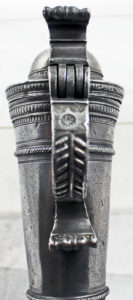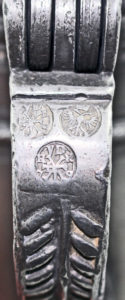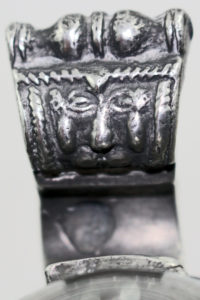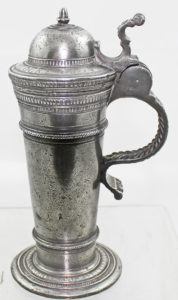 If one is looking
for an immense variety of wonderful styles, German pewter tankards and
flagons will always fit the bill. To me, one of the finest, simplest
and most elegant forms is the Rorken. Rorkens are native to Northern
Germany and have a form that evolves slightly over a few centuries. A
few examples are shown in various pewter reference books including the
Phaidon Guide to Pewter, p. 98, by Venessa Brett. These examples
including the one in this article are from the city of Lubeck, Germany.
Over the past forty years I’ve had a few different flagons from Lubeck
and all have been of excellent quality and craftsmanship. While one may
be fortunate enough to come across a scarce 18th century example,
finding an example of an earlier period is a un grand plaisir.
If one is looking
for an immense variety of wonderful styles, German pewter tankards and
flagons will always fit the bill. To me, one of the finest, simplest
and most elegant forms is the Rorken. Rorkens are native to Northern
Germany and have a form that evolves slightly over a few centuries. A
few examples are shown in various pewter reference books including the
Phaidon Guide to Pewter, p. 98, by Venessa Brett. These examples
including the one in this article are from the city of Lubeck, Germany.
Over the past forty years I’ve had a few different flagons from Lubeck
and all have been of excellent quality and craftsmanship. While one may
be fortunate enough to come across a scarce 18th century example,
finding an example of an earlier period is a un grand plaisir.
This rare, circa 1618, example which comes from Lubeck was made by the
master pewterer Herman von der Hude I whose maker’s mark is recorded in
the authoritative German reference of maker’s and their marks; Die
Deutschen Zinngiesser Und Ihre Marken, Band III, Norddeutsche
Zinngiesser, by Erwin Hintze, Vol.III, mark #1419. Two city marks (a
double headed eagle) and one maker’s mark with the maker’s initials
appear on the upper part of the handle. This is the typical marking
system for the city of Lubeck. The maker, Hermann von der Hude I, was
working in 1613 and became a master pewterer in 1616.
While many German
tankards and flagons will have flat-domed shaped covers and ball shaped
thumb-lifts, Rorkens will have a higher dome
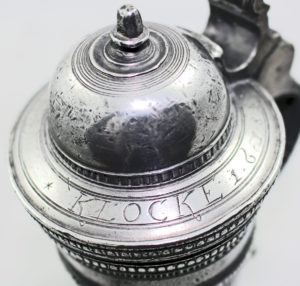 shaped cover and an erect
form thumb-lift. This early example has a pronounced raised dome and a
relief-cast decorative mascaron thumb-lift. An unusual feature of this
example includes relief decorations both inside and outside the handle.
In addition, this has an almost flat supporting base with relief
decorations. This decoration is also repeated around the upper section
of the body.
shaped cover and an erect
form thumb-lift. This early example has a pronounced raised dome and a
relief-cast decorative mascaron thumb-lift. An unusual feature of this
example includes relief decorations both inside and outside the handle.
In addition, this has an almost flat supporting base with relief
decorations. This decoration is also repeated around the upper section
of the body.
The lid is inscribed with the owner’s name and date ‘Gerdt
Klocke, 1618’ which makes this a very early example by this maker.
While this Rorken is only 7 1/4 inches in height it weighs in at a hefty
2 pounds. This is certainly the result of a very robust body structure.
Unfortunately, it took the passing of a very dear friend, Steve Smith,
for me to acquire this lovely 400 year old flagon.

 Stein Collectors International
Stein Collectors International

 Stein Collectors International
Stein Collectors International
